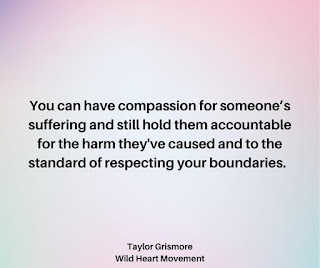We may feel sadness for what we have lost to the past — our freedom, our vigour, our values, our playfulness, our openness to life — but regrets can be a wonderful indicator of how to improve the current condition of our souls. Rather than allowing these regrets to swallow us up, we can let them identify our present needs. We can call back these lost parts of ourselves and live them in a wiser, more experienced way, instead of wasting precious time in pointless competition with the past.
This call to adventure can begin immediately, in the next moment. We can incrementally shift the direction of our impulses toward the next best thing, rather than the worst, and not become consumed by our regrets, but informed by them, as they guide us forward toward the more necessary part of our nature.
Nick Cave, The Red Hand Files
I hear it all the time. I want my old self back. I miss who I used to be. I'm not the same person.
I said those things too. I felt those things too. My typical buoyant self had been replaced by someone who was angry and bitter and miserable and I was convinced that was my new reality.
And while, yes, for a time I did feel as though I had been completely changed by my husband's infidelity, it turned out that the "old me" wasn't so much gone as momentarily eclipsed. Though that's also not entirely true because "old me" was changed by what happened. Just not as negatively as I'd feared.
That can be hard to believe, I know. It can be hard to hear. Because so deep is our anger toward our spouses for the pain they've caused, for the change in us they created, that we almost want to believe that we are irredeemably altered, that we are permanently broken. It adds fuel to our fury. Look what you've done to me! I will never be the same! You have ruined me!
And while that might feel true in the moment, it is not true. Because, while someone can devastate us, can traumatize us, they cannot ruin us without our permission. The opportunity to rise from the ashes is always ours. It won't be easy. But it is ours.
Which is why we need to release our backward gaze and begin to look ahead. There have been losses, for sure. Our innocence. Our trust. Our conviction that our marriage was somehow better or less vulnerable than the 40% of marriages that experience infidelity. But, as singer/songwriter Nick Cave writes, we can allow those regrets, those losses to inform our present. We miss our old playfulness, our joy? Well, what, exactly, are we doing to nurture it right now? How are we shifting "the direction of our impulses toward the next best thing, rather than the worst"?
I can hear you already: I'm exhausted. I'm too depressed. I don't know where to start. All of which might be true. All of which likely is true. And so we make those shifts tiny ones. One friend of mine, after losing her stepson in a horrible accident, determined that each day would she look for "loveliness". She made a concerted effort to find something "lovely" each day. Perhaps a flower. Maybe a kind gesture she noticed in the grocery store. Her snoring cat in the sunshine. The sound of rain on her roof. Looking for it, she inevitably found it. By taking time to consider it, its impact grew. And slowly, her world became lovelier, edging out the pain.
When something monumental happens to us, we think we need to mount a monumental response. When our grief is huge, we think we must push back mightily against it. Instead, we need only to reconnect with ourselves. You are not gone. Yes, you have changed. We are each of us forever changed by events in our lives – parenthood, illness, a new job, the loss of a job, witnessing an accident, observing a friend's grief. Betrayal. We are the sum of everything that happens to us, good and bad. But whether that alteration obliterates us or allows us to reimagine ourselves is entirely up to us. Pretending we don't have agency to use what happens to us, to mould it into the new selves we are creating, is declaring defeat. It is choosing to be a victim and only a victim. And you are so much more, so much greater, so much deeper, than that.



